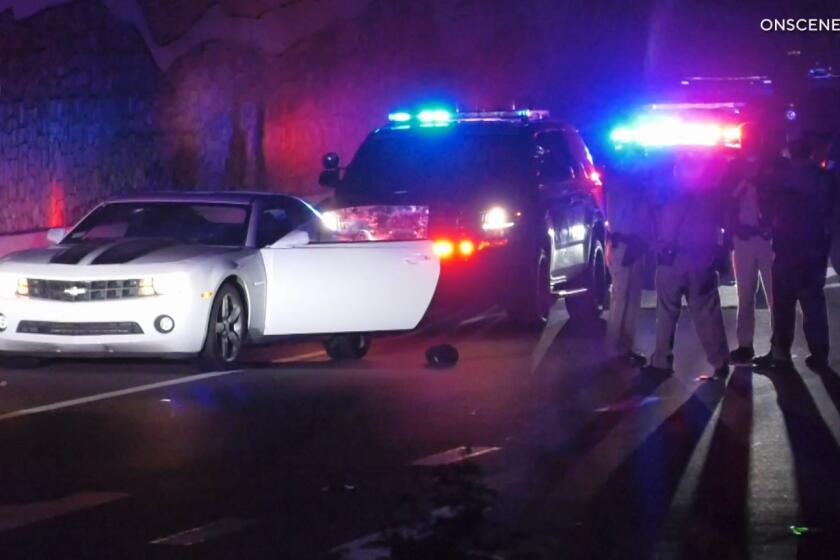Equipment Purchase at El Toro Base Under Review : Procurement: An elaborate communications system for firetrucks--complete with cassette decks and radios--draws Pentagon-ordered scrutiny.
Investigators at the Marine Corps Air Station here, acting at the direction of the Pentagon, are looking into why base officials spent more than $20,000 to equip at least four firetrucks with an elaborate communications system that includes cassette decks and AM-FM stereos.
The military’s current review was triggered by a call to the Pentagon’s fraud hot line in Washington about a month ago, the same line that led to the January firing of El Toro’s chief of staff over his use of military planes and other suspected wrongdoing.
While base officials in El Toro declined to discuss the case in detail, Col. Jim Williams, the Marine Corps’ deputy inspector general in Washington, said: “This could be a specious complaint from someone who doesn’t understand the system, or it could be very accurate and involve a legitimate impropriety. At this point we don’t know.”
The AM-FM radios and cassette decks are part of a larger system manufactured by Westnet of Santa Ana and used in some other fire departments in Orange County and around the state. The systems feature individual headsets for crew members and two-way communication with dispatch centers.
Those who defend the system say its use of headphones can protect firefighters from serious ear damage and offer them more reliability than traditional walkie-talkies and other means of emergency communication. But critics say that, good intentions aside, the system has become merely a fancy way for crews to listen to music on the job.
Still largely unknown to many in the firefighting community, the system has been put into place by the Santa Ana Fire Department and more than 30 other departments around the state in the past few years, officials at Westnet said.
Jim Andrews, equipment officer for the Santa Ana Fire Department, said the system has already been installed in 12 firetrucks and there are plans for three more at a cost of $5,500 each. He said the radio components in the system could allow firefighters to monitor civil emergency broadcasts in case of earthquakes or other disasters.
The cassette decks, he said, came with the package.
Andrews said no one has questioned the system in his city. But at the El Toro Marine Corps Air Station, its necessity has drawn sharp scrutiny from both within and outside the civilian Fire Department.
Capt. Dan Young, public affairs officer at the Orange County Fire Department, said such a stereo system is strictly prohibited in his department.
“I can’t imagine it,” Young said. “From our standpoint, you can’t spend a dime that’s not justified by the work of putting out fires. And I don’t know how something like this could add to that. It could actually detract from your ability to monitor radio traffic.”
Proponents of the system counter that dispatches automatically cut into the sound system in case of emergency. Nonetheless, investigators from the base inspector’s office in recent weeks have been conducting interviews at the department to find out how the acquisition was made.
“This is not an investigation. This is not an inquiry. This is a fact-finding procedure . . . to find out if there are any abnormalities here other than a normal system,” said Col. Roger Milton, inspector at the El Toro Marine base.
While Milton said he would not discuss details of the review, he said that “the system, as I understand it at this point, was a valid need. . . . This is not $20,000 spent on frivolous items.”
Col. Williams at the inspector general’s office said the Department of Defense wants a report on the issue by June 14 to determine whether there was “a wasteful procurement involving the Marine Corps Air Station El Toro Fire Department.”
Clinton Arnett, a civilian who heads the El Toro base Fire Department, declined to discuss how the system was acquired or how it has been implemented.
“I’m not permitted to release anything about this,” the chief said. “There’s other city departments that have the same equipment, but other than that, I can’t say any more.”
Dick Matheny, senior engineer at Westnet, said the system is designed to shield firefighters from the noise of sirens and other job hazards and to offer a backup level of communication through commercial radio.
People who criticize its use “don’t understand what type of system we’re talking about,” he said. “You obviously don’t want a boom-box stereo in a firetruck--that’s stupidity. And that isn’t what this is.”
Three employees within the Marine Fire Deparment, however, all speaking on the condition that their names not be used, said they believe the purchase was unnecessary. One said he knows of crews “taking the long way home” from assignments to finish off a music tape.
“It would really bother me if the whole Marine Corps were doing this,” said one ranking fire officer, “because I really think it’s unnecessary. You don’t ride around in a firetruck for leisure--your mind has to be on fires, on the plan of attack.”
Another complained that the department spent more than $20,000 on the system, even as it continues to require firefighters to buy their own fire-protection boots at a cost of about $130 a pair.
The sources said the $5,500 units have been placed in four or five firetrucks at El Toro, including one truck used for hazardous-material emergencies. The four crew members each have a headset, allowing them to communicate with one another from the front of the truck to the back, monitor fire dispatches, or listen to the radio or recordings.
Several firefighters within the department report that the sound system has been a source of friction among crew members trying to decide what music to listen to during their rides.
“One guy wants to listen to country-Western, and another guy’s into rock ‘n’ roll . . . Deep Purple or whatever,” said one firefighter who works on a truck but requested anonymity. “It’s caused numerous problems--shouting, bad morale for the whole shift.”
More to Read
Start your day right
Sign up for Essential California for news, features and recommendations from the L.A. Times and beyond in your inbox six days a week.
You may occasionally receive promotional content from the Los Angeles Times.




